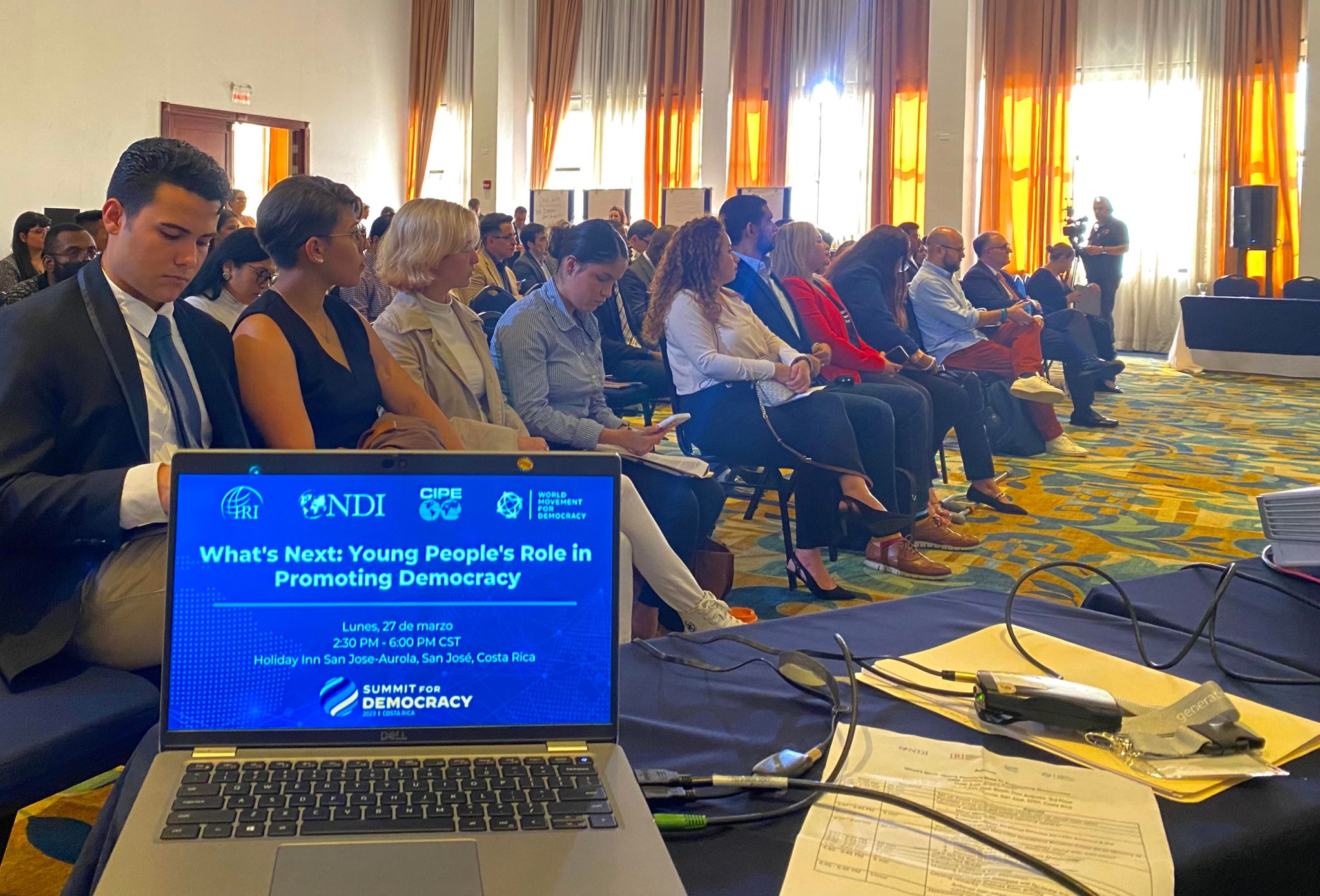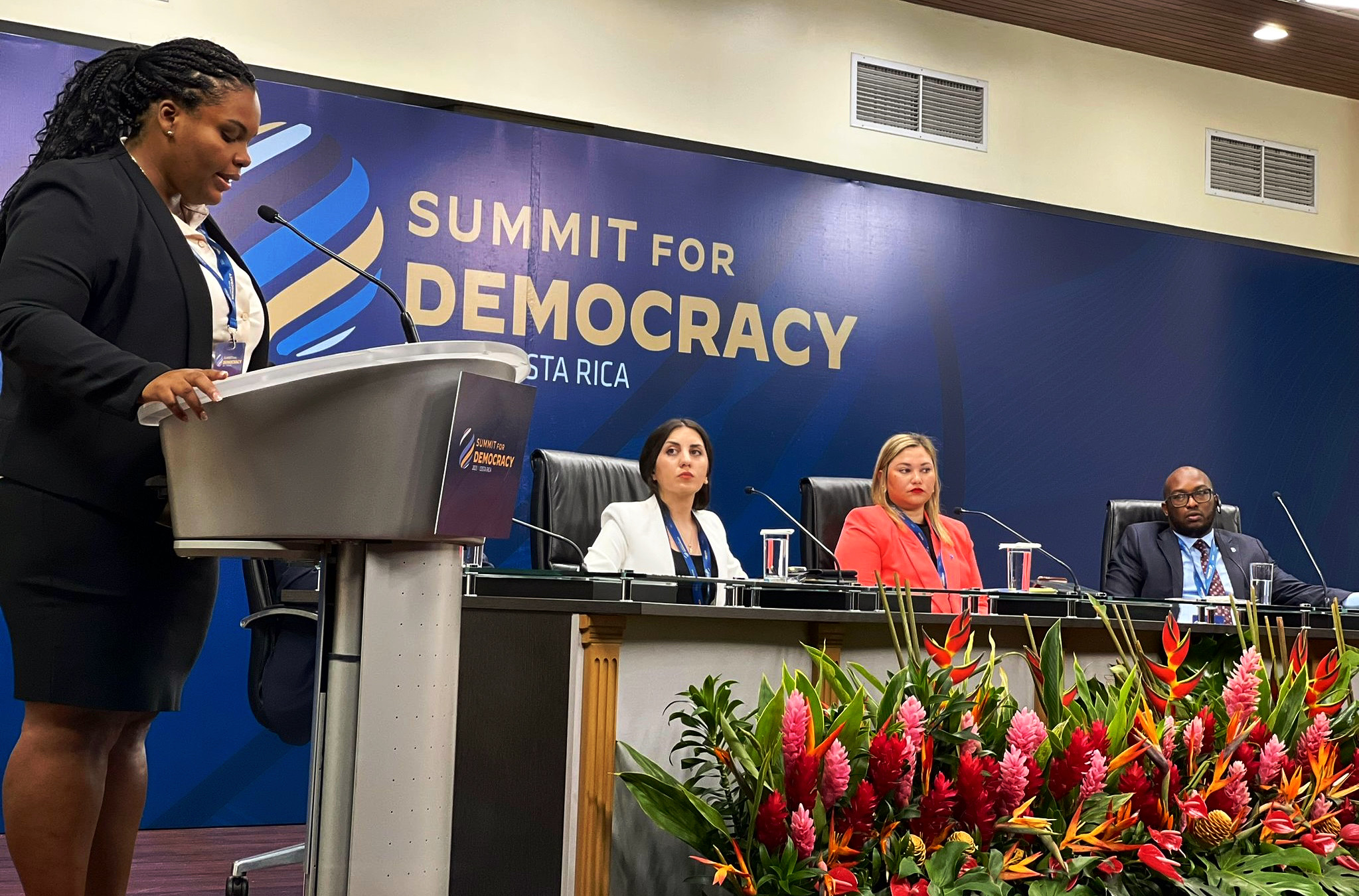
Last month, the International Republican Institute’s (IRI) Youth and Inclusion practice led a delegation to the second Summit for Democracy (S4D) in Costa Rica, comprised of 15 youth leaders and democracy activists. In partnership with the governments of the United States, Costa Rica, the Netherlands, the Republic of Korea, and Zambia, the Summit in Costa Rica brought together hundreds of youth leaders and activists for a series of panels, workshops, and discussions on the role of youth in democratic systems.
While in San José, IRI facilitated an official side event entitled “What’s Next? Young People’s Role in Promoting Democracy” in collaboration with the National Democratic Institute (NDI) and the Center for International Private Enterprise (CIPE), funded by the World Movement for Democracy. The event featured a keynote address by Costa Rican Minister for Youth and Culture Nayuribe Guadamuz, in addition to IRI and NDI Latin American and Caribbean (LAC) leadership and two Generation Democracy (GenDem) Network members: Željko Vukša Fejzić (Bosnia and Herzegovina) and Elyes Guermazi (Tunisia). The panel also featured Cuban human rights activist Rosa María Payá. Event participants also engaged in interactive discussions following the panel discussion to provide recommendations on additional ways in which young people can more meaningfully promote democratic norms in their countries and regions.

IRI’s GenDem also hosted a “S4D Watch Party” to view President Biden’s remarks during the S4D on March 29—which was attended by representatives from GenDem, Juventud LAC, Global Democracy Coalition, International Institute for Democracy and Electoral Assistance (IDEA), International Foundation for Electoral Systems, NDI, and USAID.
On March 29, IRI additionally supported the participation of four youth representatives from the Ministries of Foreign Affairs of Costa Rica, the Dominican Republic, Ecuador, and Panama for a joint IRI-Konrad Adenauer Stiftung (KAS) event entitled “Building democracy in the Alliance for Development in Democracy (ADD).” The ADD was created in 2021 in response to expanding authoritarianism in the LAC region with the purpose of supporting economic development and democracy.
The youth representatives networked with other young leaders from the four ADD countries, including Carlos Felipe Garcia, a member of the National Assembly of Costa Rica; Rafael Feliz Garcia, the Minister of Youth of the Dominican Republic; Carlos Rubio, the former Minister of Government of Panama; as well as Jatzel Roman, the former Vice-Minister of Foreign Affairs of the Dominican Republic and GenDem member. Representatives discussed problems surrounding youth engagement and solutions that could be implemented at a country and ADD level.
On March 30, representatives attended the official S4D activities at the Supreme Election Tribunal, which included interventions from the President of Costa Rica, Rodrigo Chaves Robles, the US Ambassador to the United Nations, Linda Thomas Greenfield, and Thomas Garrett, the Secretary General of the Community for Democracies (CoD), among others.
A highlight of the official activities was the the “Youth Activism in Civil Society” panel hosted by International IDEA and RedLad , in which three GenDem members participated inclduing Solayman Maso (Philippines), Dennis Sangale Keis (Kenya), and Željko Vukša Fejzić (Bosnia and Herzegovina). During this event, the U.S. Special Envoy for Youth, Abby Finkenauer, provided keynote remarks. Two GenDem members, Lourdes Argueta (El Salvador) and Dennis Sangale Keis (Kenya), also participated in the main event on the CODs’ panel, “How to Increase Youth Engagement and Participation in Democracies.” U.S. Special Envoy Abby Finkenauer provided keynote remarks during this event as well.

On the last day of the Summit, IRI’s Youth Delegation attended the launch of the EDYN Youth Participation handbook, which includes three GenDem members’ case studies. Following the Summit, IRI hosted an after-action workshop with GenDem members, which included outlining next steps for sharing the outputs of S4D, as well as providing feedback on the planning of the recently announced S4D in South Korea.
Stay tuned for more updates on GenDem’s Twitter and website, as well as IRI’s Twitter, on how IRI and its flagship youth network aims to bring the ideas discussed at the second Summit for Democracy into fruition through collective action and youth innovation.
About Generation Democracy
The Generation Democracy Network is comprised of over 300 youth spanning across over 70 countries—all of whom are testing, replicating and scaling new ideas to advance the meaningful participation of youth in decision-making processes.
Top